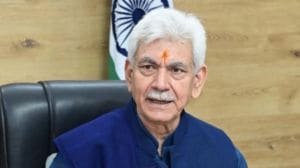Celebraties lend their fame for a cause
UNITED NATIONS, OCT 24: More than 40 world celebrities, including boxing great Muhammad Ali, actor Michael Douglas and Spice Girl Geri Hal...

UNITED NATIONS, OCT 24: More than 40 world celebrities, including boxing great Muhammad Ali, actor Michael Douglas and Spice Girl Geri Halliwell, spoke on Monday about the rewards and frustrations of using their fame to fight for causes on behalf of the United Nations.
Ali, the three-time world heavyweight champion, talked about using religion in daily life, Halliwell campaigned for safe sex, South African Nobel laureate Nadine Gordimer advocated a more focused campaign against poverty, and Douglas described the guns-for-jobs programme he promoted in Albania .
All are peace or goodwill ambassadors invited to U N headquarters in one group by Secretary-General Kofi Annan. Some were chosen by Annan himself. Others, including actress Mia Farrow and singer Harry Belafonte, represent U N agencies for children, development, human rights, drug control, AIDS, women’s rights or the fight against poverty.
But it was the first time all of them had come together to discuss their work since 1954, when U S actor and comedian Danny Kaye became the first goodwill ambassador for UNICEF.
Introducing a forum on "The United Nations and Celebrity Advocacy in an Age of Cynicism," Annan told the celebrities from 30 nations that he could "neither pole-vault nor play the violin." He said the famous had the means to "connect with people practically anywhere on Earth."
Halliwell, known as Ginger Spice until she Left the Spice Girls in 1998, said she had been "dropped into the deep end" as an ambassador for the U N Population Fund.
"Fame is like a bright light," she said, adding that sometimes people listened to her for all the wrong reasons. But if only two people hear a message on safe sex or the dangers of AIDS, "that’s brilliant and overrides all the cynicism," she said.
Peter Piot, head of the U N AIDS programme, told participants they were all role models, the famous who admitted they had contracted HIV or AIDS and those campaigning for safe sex.
"When Ronaldo says to play safe,’ that does more in terms of AIDS prevention than a thousand billboards saying AIDS Kills,’" he said in reference to the Brazilian soccer player, an ambassador for the U N Development Programme.
Senegalese musician Youssou N’Dour, a goodwill ambassador for UNICEF, talked about a song he wrote about using condoms to prevent AIDS. At one concert, 50,000 people "were singing with me because they really understood the message," he said.
The dean of the ambassadors, Peter Ustinov, said he learned early as a messenger for UNICEF that love might be a universal symbol but respect was the key to having an impact.
"If you don’t respect those people you are talking to, even if they are young — especially if they are very young — you don’t deserve their respect," he said.
Actress Susan Sarandon drew support from Somali model Waris Dirie, Italian author and journalist Anna Cataldi, and others in voicing frustration at not being able to follow up on combating the misery they encountered in their travels.
Sarandon, also a UNICEF messenger, said U N structures were complicated and bureaucratic if one wanted to fulfil promises — such as providing clear water in Tanzania — encountered on trips. Instead, she is raising money for these projects.
"There wasn’t a way to follow through except for doing press. It’s very frustrating," she said.
Cataldi, a peace messenger appointed by Annan, who just returned from Afghanistan, said, "I saw people die … starving to death from drought, the worst in 20 years." "My word is Help Afghanistan,’" she added.
Gordimer, a novelist, questioned how much envoys such as herself and actor Danny Glover, both goodwill ambassadors for the U N Development Programme, "So far, those of us appointed do not have the opportunity to have an impact on globalization issues," she said. "We are not the right people."
Douglas said he first thought about arms control about 20 years ago while making "The China Syndrome," a film about the spectre of atomic destruction at an American nuclear plant. From there, he went on to promote gun control in the United States and then a U N programme that trades arms for jobs in Albania.
"If it works, it can be moved to other areas of civil strife, particularly in Africa," he said.






- 01
- 02
- 03
- 04
- 05

























